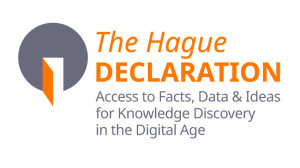 Civil society project organized by IFLA, Link (CC-BY)
Civil society project organized by IFLA, Link (CC-BY)
Over 50 organisations have signed The Hague Declaration on Knowledge Discovery in the Digital Age (www.thehaguedeclaration.com), which calls for immediate changes to intellectual property (IP) law and the removal of other barriers preventing widened and more equal access to data.
Improved treatments for diseases, answers to global issues such as climate change and billions in government savings are among the potential benefits to be gained, if the principles outlined in the Declaration are adopted by governments, businesses and society.
The Declaration asserts that copyright was never designed to regulate the sharing of facts, data and ideas ‒ nor should it. The right to receive and impart information and ideas is guaranteed by the Universal Declaration of Human Rights[1] but the modern application of IP law often limits this right, even when these most simple building blocks of knowledge are used.
“The rapidly changing digital environment, increased computing power and the sheer quantity of data being produced makes it essential for researchers and society to be able to use modern techniques and tools to help them make new discoveries. Research practices could be revolutionised and lives could literally be saved, if we can achieve better access to the knowledge contained within Big Data,” said Kristiina Hormia-Poutanen, President of LIBER (www.libereurope.eu), the Association of European Research Libraries, which has led work to develop the Declaration.
A new approach to knowledge discovery is critical at a time when society is facing a literal data deluge. The digital universe, or the data we create and copy annually, is doubling in size every two years and is expected to reach 44 trillion gigabytes by 2020[2].
In addition to clarity around the scope of IP law, a skills gap and a lack of infrastructure must also be addressed if computers are to be better employed to extract and recombine data in order to identify patterns and trends. This process, known as Content Mining, is widely recognised as the only way to deal effectively with Big Data.
“Given the need to make sense of the ever-expanding literature and derive new insights, the Wellcome Trust strongly supports the right of researchers to mine content to which they already have lawful access. The Hague Declaration is an important step in demonstrating the common vision that knowledge discovery and reuse should not be constrained by existing legal frameworks and uncertainty. In particular, we are advocating for reform of copyright law at European level to permit data and text mining for all uses, both commercial and non-commercial,” said Will Greenacre, Policy Officer at The Wellcome Trust (www.wellcome.ac.uk).
Organisations and individuals who wish to support the Declaration can add their signature on the official website, www.thehaguedeclaration.com. In so doing, they will officially recognise the huge potential for knowledge discovery whilst also acknowledging that steps need to be taken to ensure that everyone can benefit from this potential.
Further Information:
- See the Declaration website: www.thehaguedeclaration.com to read the full text of the Declaration and download an accompanying infographic.
- Contact LIBER, the Association of European Research Libraries, which has been leading the work to develop the Declaration: liber@kb.nl
———————-
FOOTNOTES:
1 http://www.un.org/en/documents/udhr/index.shtml#a19
2 http://www.emc.com/leadership/digital-universe/2014iview/executive-summary.htm




